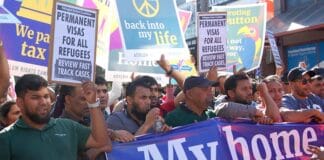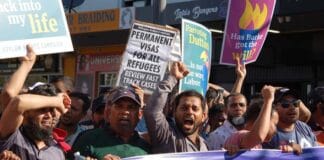Tony Abbott is planning on reintroducing Temporary Protection Visas (TPVs), a Howard government policy initially proposed by Pauline Hanson. TPVs mean that those granted refugee status will be denied permanent protection and security. They will be forced to re-apply for a visa after three years or less. Abbott’s TPV policy is even worse than Howard’s. Refugees will be put on TPVs indefinitely, denied the right to apply for permanent protection, and forced to live a life of limbo.
Sha Hussein Hassani is a Hazara refugee from Afghanistan who arrived in Australia in 1999. When he was released from detention and granted his refugee status in 2000, he was given a Temporary Protection Visa (TPV). He spoke to Solidarity’s Amy Thomas about his experience.
Why did you come to Australia as a refugee?
I fled persecution [from] the Taliban regime. They were hunting Hazaras, they still are. Both in Quetta [in Pakistan] and Afghanistan. Lots of Hazara were taken away.
How did you come here? What happened when you arrived in Australia?
I came from Afghanistan to Pakistan by road. Then from Pakistan to Indonesia by plane, then to Australia by boat. I was on my own.
We were happy that we survived the sea. The last two days we were scared we might drown. At one stage our boat was not working, the engine stopped.
We were intercepted by the Navy and taken to an island. We were put on a bigger boat together [with another boatload], then we were checked. We were stripped down naked. Our underwear and everything. We were taken to Curtin detention centre [in remote Western Australia].
What were things like in Curtin?
I was in Curtin for seven months. At the beginning, we were expecting good things. But then the Australian government panicked that there was an invasion coming—of boat people! They changed their policy and introduced Temporary Protection Visas.
For about three months, there was nothing happening about my refugee claim. Just an initial interview. Then we started protesting, saying we need to talk [to Immigration], asking them what was going to happen [with our refugee claims].
What happened when you were released?
I was on a temporary visa. I had no right to study. I did go to school. The people in one school somehow dodged the system and put me in a high school for Year 11 and 12. Then I finished my diploma in Graphic Design and now I am studying art.
What was your experience on a TPV like?
The experience was uncertainty. If I was given a permanent visa, I would have worked more steadily without concern. But it was always in the back of my mind, and of my friends’ minds, that we would be sent back. I was preparing to be sent back, I was saving money.
Nobody was able to focus, to start a new life here, to be part of the society. Because there’s a feeling they’re not accepting you, you don’t belong here, you’re only temporary. They act like they have taken mercy on you. The three years finish and you have to plea again and it’s up to them if they want you to stay or not. It was a psychological battle for us to be able to start our life here. Most of the people were depressed.
I could not connect with people, if I made friends, I told them, I might have to go back.
There were people that were sent back. Not that they were not refugees, but just to send us all a message.
I never got to see my family, I did not know where they were. Until I went back in 2007 I did not know much about them. You couldn’t travel on a temporary visa, you can’t come back. No one travelled because if you travelled it was one way.
After six years, in 2006, I became a citizen. I had to wait for three years on my temporary visa to finish, then I submitted a case, and over three years I became a citizen.
What campaigning did you do?
I was very active for refugees. We formed a soccer team, with a teacher. She used to make appointments with different government officials. They would promise us things and say they would try to push the issue. But it was only when the government changed in 2007 that they got rid of TPVs.
What do you think about the reintroduction of Temporary Protection Visas (TPVs)?
They are reminding me again that I’m not welcome. Even though the people that I meet, they are welcoming. The recent boat arrivals, the politicians are telling them directly that they are not welcome.
It would be very hard to survive now on a TPV. If you don’t have money, you will end up in the street. They will create a big community of desperate people. I have been to Europe, the refugees sleep under bridges and in churches.
What they say now, about stopping deaths at sea and saving lives, who are they to say that, when they put people in detention centres and treat them like they’re not human? How can they speak of humanitarianism?
Sha now lives in Brisbane and works as an artist. His work can be viewed on his web site: shasarwari.com





